- Home
- Pat Conroy
The Prince of Tides
The Prince of Tides Read online
The Prince of Tides
Pat Conroy
This book is dedicated
with love and gratitude:
to my wife, Lenore Gurewitz Conroy,
who hung the moon;
to my children, Jessica, Melissa, Megan,
and Susannah, Conroys all;
to Gregory and Emily Fleischer;
to my brothers and sisters, Carol, Michael,
Kathleen, James, Timothy, and Thomas;
to my father,
Colonel Donald Conroy, USMC (Ret.),
still great, still Santini;
and to the memory of my mother, Peg,
the extraordinary woman who built
and inspired this house
I owe many people for their generosity and support during the writing of this book. My stepfather, Captain John Egan, USN, treated my family and me with great love during the time our mother was dying of leukemia. Turner and Mary Ball let me have the use of their mountain home for long stretches of time during the writing of this book. James Landon and Al Campbell also gave me the key to their mountain home in Highlands, North Carolina. Judge Alex Sanders, the greatest of South Carolinians, told me many of the stories included in this book as we sat in Joe and Emily Cumming’s house at Tate Mountain. Julia Bridges typed the book with gusto. Nan Talese is a splendid editor and a woman of uncommon beauty. And Sarah Flynn was superb. Julian Bach is my literary agent and one of the finest men I’ve ever met. Houghton Mifflin, my publishing company, is family. Barbara Conroy has been a fine lawyer and an exemplary mother to our children. Cliff Graubert of the Old New York Book Shop has been wonderful. Derrill Randel has been extraordinarily brave. Thanks also to Dent Acree, Peggy Houghton, and Judge William Sherrill. I’ve had a lucky life with friendships. I thank all my friends in Atlanta, the ones in Rome, Italy, and all those in between. A hug for you now and I’ll get to your names next time out.
Contents
PROLOGUE
CHAPTER 1
CHAPTER 2
CHAPTER 3
CHAPTER 4
CHAPTER 5
CHAPTER 6
CHAPTER 7
CHAPTER 8
CHAPTER 9
CHAPTER 10
CHAPTER 11
CHAPTER 12
CHAPTER 13
CHAPTER 14
CHAPTER 15
CHAPTER 16
CHAPTER 17
CHAPTER 18
CHAPTER 19
THE SOUTHERN WAY
CHAPTER 20
CHAPTER 21
CHAPTER 22
CHAPTER 23
CHAPTER 24
CHAPTER 25
CHAPTER 26
CHAPTER 27
EPILOGUE
A BIOGRAPHY OF PAT CONROY
PROLOGUE
My wound is geography. It is also my anchorage, my port of call.
I grew up slowly beside the tides and marshes of Colleton; my arms were tawny and strong from working long days on the shrimp boat in the blazing South Carolina heat. Because I was a Wingo, I worked as soon as I could walk; I could pick a blue crab clean when I was five. I had killed my first deer by the age of seven, and at nine was regularly putting meat on my family’s table. I was born and raised on a Carolina sea island and I carried the sunshine of the low-country, inked in dark gold, on my back and shoulders. As a boy I was happy above the channels, navigating a small boat between the sandbars with their quiet nation of oysters exposed on the brown flats at the low watermark. I knew every shrimper by name, and they knew me and sounded their horns when they passed me fishing in the river.
When I was ten I killed a bald eagle for pleasure, for the singularity of the act, despite the divine, exhilarating beauty of its solitary flight over schools of whiting. It was the only thing I had ever killed that I had never seen before. After my father beat me for breaking the law and for killing the last eagle in Colleton County, he made me build a fire, dress the bird, and eat its flesh as tears rolled down my face. Then he turned me in to Sheriff Benson, who locked me in a cell for over an hour. My father took the feathers and made a crude Indian headdress for me to wear to school. He believed in the expiation of sin. I wore the headdress for weeks, until it began to disintegrate feather by feather. Those feathers trailed me in the hallways of the school as though I were a molting, discredited angel.
“Never kill anything that’s rare,” my father had said.
“I’m lucky I didn’t kill an elephant,” I replied.
“You’d have had a mighty square meal if you had,” he answered.
My father did not permit crimes against the land. Though I have hunted again, all eagles are safe from me.
It was my mother who taught me the southern way of the spirit in its most delicate and intimate forms. My mother believed in the dreams of flowers and animals. Before we went to bed at night as small children, she would reveal to us in her storytelling voice that salmon dreamed of mountain passes and the brown faces of grizzlies hovering over clear rapids. Copperheads, she would say, dreamed of placing their fangs in the shinbones of hunters. Ospreys slept with their feathered, plummeting dreamselves screaming through deep, slow-motion dives toward herring. There were the brute wings of owls in the nightmares of ermine, the downwind approach of timber wolves in the night stillness of elk.
But we never knew about her dreams, for my mother kept us strangers to her own interior life. We knew that bees dreamed of roses, that roses dreamed of the pale hands of florists, and that spiders dreamed of luna moths adhered to silver webs. As her children, we were the trustees of her dazzling evensongs of the imagination, but we did not know that mothers dreamed.
Each day she would take us into the forest or garden and invent a name for any animal or flower we passed. A monarch butterfly became an “orchid-kissing blacklegs”; a field of daffodils in April turned into a “dance of the butter ladies bonneted.” With her attentiveness my mother could turn a walk around the island into a voyage of purest discovery. Her eyes were our keys to the palace of wildness.
My family lived in splendid isolation on Melrose Island in a small white house my grandfather had helped build. The house faced the inland waterway, and the town of Colleton could be seen down the river, its white mansions set like chess pieces above the marsh. Melrose Island was a lozenge-shaped piece of land of twelve hundred acres surrounded on four sides by salt rivers and creeks. The island country where I grew up was a fertile, semitropical archipelago that gradually softened up the ocean for the grand surprise of the continent that followed. Melrose was only one of sixty sea islands in Colleton County. At the eastern edge of the county lay six barrier islands shaped by their daily encounters with the Atlantic. The other sea islands, like Melrose, enscarved by vast expanses of marshland, were the green sanctuaries where brown and white shrimp came to spawn in their given seasons. When they came, my father and other men like him were waiting in their fine and lovely boats.
When I was eight I helped my father build the small wooden bridge that linked our lives to a narrow causeway through the marsh that connected to the much larger St. Anne’s Island, which itself was linked to the town of Colleton by a long steel drawbridge across the river. It took five minutes for my father to drive his pickup truck from our house to the wooden bridge; it took him another ten to drive into the town of Colleton.
Before we built the bridge in 1953, my mother would take us to school in Colleton by boat. No matter how bad the weather, she would steer us across the river each morning and be waiting for us at the public dock each afternoon. It would always be a faster trip to Colleton by Boston Whaler than it would ever be by truck. Those years of taking us to school by water turned my mother into one of the finest pilots of small craft I have ever seen, bu
t she rarely entered the boat once the bridge was built. The bridge only connected us with our town; it connected my mother with the world beyond Melrose Island, so inconceivably rich with promise.
Melrose was the one notable possession of my father’s family, a passionate but unlucky clan whose decline after the Civil War was quick, certain, and probably inevitable. My great-great-grandfather, Winston Shadrach Wingo, had commanded a battery under Beauregard that fired on Fort Sumter. He died a pauper in the Confederate Soldiers’ Home in Charleston and refused to speak to a Yankee, male or female, until the day he died. He had won Melrose Island in a horseshoe game near the end of his life, and that island, uncleared and malarial, passed down through three generations of declining Wingos until it came to my father by default. My grandfather had tired of owning it and my father was the only Wingo willing to pay the state and federal taxes to keep it out of the government’s hands. But that horseshoe game would assume celebrated dimensions in our family history and we would always honor Winston Shadrach Wingo as our family’s first athlete of note.
I do not know, however, when my mother and father began their long, dispiriting war against each other. Most of their skirmishes were like games of ringolevio, with the souls of their children serving as the ruined captured flags in their campaigns of attrition. Neither considered the potential damage when struggling over something as fragile and unformed as a child’s life. I still believe that they both loved us deeply, but, as with many parents, their love proved to be the most lethal thing about them. They were remarkable in so many ways that the gifts they bestowed almost equaled the havoc they so thoughtlessly wreaked.
I was the son of a beautiful, word-struck mother and I longed for her touch many years after she felt no obligation to touch me. But I will praise her for the rest of my life for teaching me to seek out the beauty of nature in all its shapes and fabulous designs. It was my mother who taught me to love the lanterns of night fishermen in the starry darkness and the flights of brown pelicans skimming the curling breakers at dawn. It was she who made me take notice of the perfect coinage of sand dollars, the shapes of flounders inlaid in sand like the silhouettes of ladies in cameos, the foundered wreck near the Colleton Bridge that pulsed with the commerce of otters. She saw the world through a dazzling prism of authentic imagination. Lila Wingo would take the raw material of a daughter and shape her into a poet and a psychotic. With her sons she was gentler, and the results took longer to tally. She preserved for me the multiform appearances of my life as a child, the portraitures and still lifes visible through the blooming window of time. She reigned as the queen of exquisite imagery in the eye of a worshipful son, yet I cannot forgive her for not telling me about the dream that sustained her during my childhood, the one that would cause the ruin of my family and the death of one of us.
The child of a beautiful woman, I was also a shrimper’s son in love with the shape of boats. I grew up a river boy with the smell of the great salt marsh predominant in sleep. In the summers, my brother, my sister, and I worked as apprentice strikers on my father’s shrimp boat. Nothing pleased me more than the sight of the shrimping fleet moving out before sunrise to rendezvous with the teeming shoals of shrimp that made their swift dashes through the moon-sweetened tides at first light. My father drank his coffee black as he stood at the wheel of the boat and listened to the heavily accented voices of the other shrimp boat captains keeping each other company. His clothes smelled like shrimp and there was nothing that water or soap or my mother’s hands could do to change that. When he worked hard, his smell would change, the sweat cutting into the odor of fish and becoming something different, something wonderful. Standing beside him as a small boy, I would press my nose against my father’s shirt and he would smell like some rich, warm acre. If Henry Wingo had not been a violent man, I think he would have made a splendid father.
One bright summer night, when we were very small and the humid air hung like moss over the lowcountry, my sister and brother and I could not sleep. Our mother took us out of the house, Savannah and I with summer colds and Luke with a heat rash, and walked all of us down to the river and out onto the dock.
“I have a surprise for my darlings,” our mother said as we watched a porpoise move toward the Atlantic through the still, metallic waters. We sat at the end of the floating dock and stretched our legs, trying to touch the water with our bare feet.
“There’s something I want you to see. Something that will help you sleep. Look over there, children,” she said, pointing out toward the horizon to the east.
It was growing dark on this long southern evening and suddenly, at the exact point her finger had indicated, the moon lifted a forehead of stunning gold above the horizon, lifted straight out of filigreed, light-intoxicated clouds that lay on the skyline in attendant veils. Behind us, the sun was setting in a simultaneous congruent withdrawal and the river turned to flame in a quiet duel of gold. . . . The new gold of moon astonishing and ascendant, the depleted gold of sunset extinguishing itself in the long westward slide, it was the old dance of days in the Carolina marshes, the breathtaking death of days before the eyes of children, until the sun vanished, its final signature a ribbon of bullion strung across the tops of water oaks. The moon then rose quickly, rose like a bird from the water, from the trees, from the islands, and climbed straight up—gold, then yellow, then pale yellow, pale silver, silver-bright, then something miraculous, immaculate, and beyond silver, a color native only to southern nights.
We children sat transfixed before that moon our mother had called forth from the waters. When the moon had reached its deepest silver, my sister, Savannah, though only three, cried aloud to our mother, to Luke and me, to the river and the moon, “Oh, Mama, do it again!” And I had my earliest memory.
We spent our formative years marveling at the lovely woman who recited the dreams of egrets and herons, who could summon moons, banish suns to the west, then recall a brand-new sun the following morning from far beyond the breakers of the Atlantic. Science was of no interest to Lila Wingo, but nature was a passion.
To describe our growing up in the lowcountry of South Carolina, I would have to take you to the marsh on a spring day, flush the great blue heron from its silent occupation, scatter marsh hens as we sink to our knees in mud, open you an oyster with a pocketknife and feed it to you from the shell and say, “There. That taste. That’s the taste of my childhood.” I would say, “Breathe deeply,” and you would breathe and remember that smell for the rest of your life, the bold, fecund aroma of the tidal marsh, exquisite and sensual, the smell of the South in heat, a smell like new milk, semen, and spilled wine, all perfumed with seawater. My soul grazes like a lamb on the beauty of indrawn tides.
I am a patriot of a singular geography on the planet; I speak of my country religiously; I am proud of its landscape. I walk through the traffic of cities cautiously, always nimble and on the alert, because my heart belongs in the marshlands. The boy in me still carries the memories of those days when I lifted crab pots out of the Colleton River before dawn, when I was shaped by life on the river, part child, part sacristan of tides.
Once while sunning ourselves on a deserted beach near Colleton, Savannah shouted for Luke and me to look out toward the sea. She was screaming and pointing toward a school of pilot whales that had risen out of the sea in a disoriented pack; they surged around us, past us, until forty whales, dark and glistening like cordovan, lay stranded and doomed on the shore.
For hours we walked from back to back of the dying mammals, speaking out to them in the cries of children, urging them to try to return to the sea. We were so small and they were so beautiful. From far off, they looked like the black shoes of giants. We whispered to them, cleared sand from their blowholes, splashed them with seawater, and exhorted them to survive for our sake. They had come from the sea mysteriously, gloriously, and we three children spoke to them, mammals to mammals, in the stunned, grieving canticles of children unfamiliar with willful death. We stayed wit
h them all that day, tried to move them back to the water by pulling at their great fins, until exhaustion and silence crept in with the dark. We stayed with them as they began to die one by one. We stroked their great heads and prayed as the souls of whales lifted out of the great black bodies and moved like frigates through the night and out to sea where they dove toward the light of the world.
Later when we spoke of our childhood, it seemed part elegy, part nightmare. When my sister wrote the books that made her famous and journalists asked what her childhood was like, she would lean back, brush her hair out of her eyes, grow serious, and say, “When I was a child, my brothers and I walked on the backs of dolphins and whales.” There were no dolphins, of course, but there were to my sister. That is how she chose to remember it, how she chose to celebrate it, how she chose to put it down.
But there is no magic to nightmares. It has always been difficult for me to face the truth about my childhood because it requires a commitment to explore the lineaments and features of a history I would prefer to forget. For years I did not have to face the demonology of my youth; I made a simple choice not to and found solace in the gentle palmistry of forgetfulness, a refuge in the cold, lordly glooms of the unconscious. But I was drawn back to the history of my family and the failures of my own adult life by a single telephone call.
I wish I had no history to report. I’ve pretended for so long that my childhood did not happen. I had to keep it tight, up near the chest. I could not let it out. I followed the redoubtable example of my mother. It’s an act of will to have a memory or not, and I chose not to have one. Because I needed to love my mother and father in all their flawed, outrageous humanity, I could not afford to address them directly about the felonies committed against all of us. I could not hold them accountable or indict them for crimes they could not help. They, too, had a history—one that I remembered with both tenderness and pain, one that made me forgive their transgressions against their own children. In families there are no crimes beyond forgiveness.

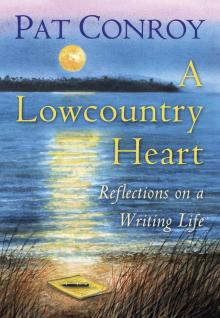 A Lowcountry Heart: Reflections on a Writing Life
A Lowcountry Heart: Reflections on a Writing Life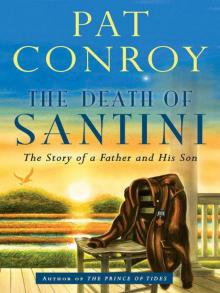 The Death of Santini: The Story of a Father and His Son
The Death of Santini: The Story of a Father and His Son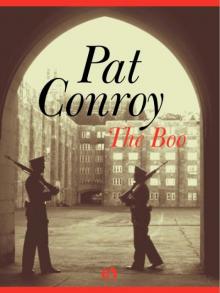 The Boo
The Boo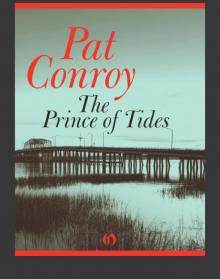 The Prince of Tides
The Prince of Tides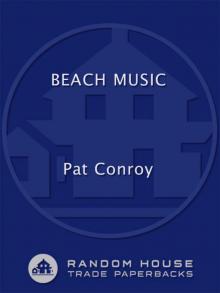 Beach Music
Beach Music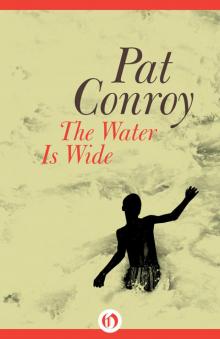 The Water Is Wide
The Water Is Wide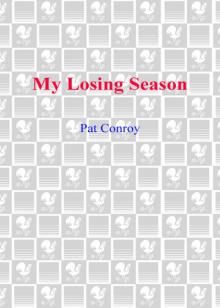 My Losing Season
My Losing Season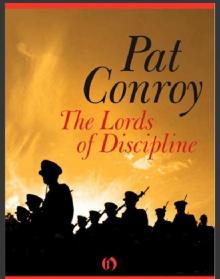 The Lords of Discipline
The Lords of Discipline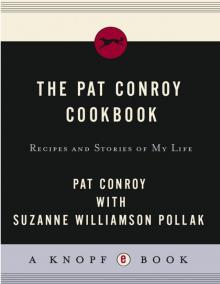 Pat Conroy Cookbook
Pat Conroy Cookbook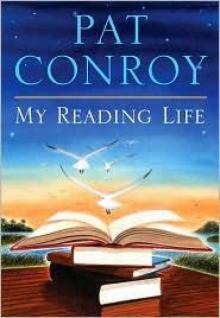 My Reading Life
My Reading Life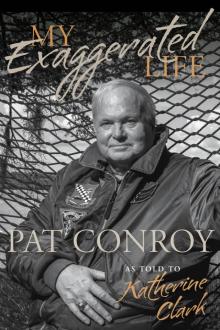 My Exaggerated Life
My Exaggerated Life The Pat Conroy Cookbook
The Pat Conroy Cookbook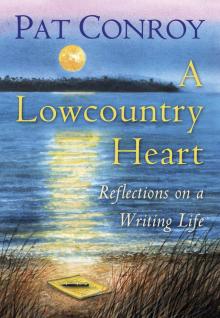 A Lowcountry Heart
A Lowcountry Heart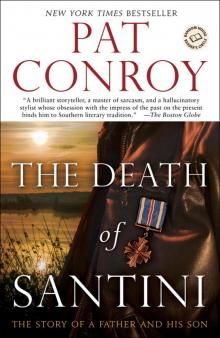 The Death of Santini
The Death of Santini